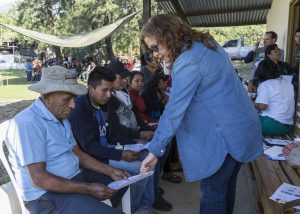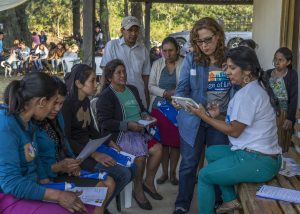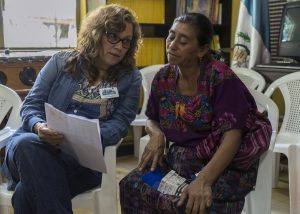What I Learned from Educating Guatemalan Coffee Farmers on Kidney Disease Prevention
I signed up with Bridge of Life (BOL) as a volunteer because I felt the need to do something with extra meaning in my life. As a younger woman, I had the chance to travel South America and dabbled a bit in family planning and breastfeeding education, and, boy, did I feel an enormous sense of reward. So I was thrilled when I received a call for an interview from BOL and even more thrilled when I found out the mission would be to Guatemala.
I had visited Guatemala about 20 years ago, just as their civil war was ending. I was a tourist inspired by the love of beautiful textiles, the Incaparina case study in college (a study on nutrition) and my Guatemalan friends and patients in Los Angeles. They expressed their love of country with a mixture of pride and sadness for the conditions they fled back home. I had to experience Guatemala for myself. As I travelled from the most “touristy” places, such as Tikal, to some of the smallest towns in Huehuetenango, I kept telling myself I would come back some day but in a different capacity. I hoped to put a little grain of sand in the construction of a brighter future for those who struggle to create a better life for their families. I have been fortunate enough all of my life to have food, clean water, a home, access to healthcare, and more, so this opportunity was a reminder of how many people in this world still live in poverty and do what is needed to survive.
The experience on the coffee farm in Guatemala was very personally rewarding, a dream come true and then some. Our days on this chronic kidney disease screening mission started early, with station set-up at designated locations. Shortly after, the flow of patients started and didn’t stop until the last person was seen, usually in the late afternoon. I helped a for a short time at the registration desk but was then assigned to the preventative education station, where I would remain all three days having one of the best times of my life, despite how exhausted I was.
I felt that the participants were highly appreciative to learn their screening test results and information on how to better maintain their kidney health. And I trusted that most people who I saw would make at least some change in their lives and that of their families based on this education. Sometimes those small changes can make a great difference in the long run, and that belief fueled my energy to do justice to their needs.
As with most education, I also began to learn new things even as the teacher, but in this case the lessons were so very humbling. When I tried to educate on drinking more water, I learned that not all water is “equal.” There is “pure water,” and then there is gaseosa or “Coke water” – the preferred drink since most of the workers have limited access to good drinking water. And, if you are going to buy bottled water, you might as well get the sweet stuff and get some pleasure out of it (and for most, some much needed calories). When I tried to teach about integrating more vegetables into diets, I learned the names of the green, leafy vegetables that these individuals consume and that most people really enjoy them, but there is not enough water to grow them at home, and vegetables from the market often spoil within two days. When I tried to talk about the need for protein, I learned that most eat “vegan,” but only by necessity, not by choice. And I learned that one chicken can feed 10 people but is a luxury meal that’s reserved for once a week (maybe).
When I tried to educate participants about their lab results, I learned that many individuals had never even seen a doctor, and if they had, that lab tests and results were never explained to them (if they even received any tests at all). As I continued to provide preventative education, I learned that these individuals appreciated silly jokes by shyly laughing as I tried to make them feel more comfortable in a didactic environment that they were unfamiliar with. Getting a formal education is not much of an option in a society where people are put to work at a very early age to help their family survive.
But perhaps the greatest thing I learned is that, despite their struggles, the rich Mayan culture of these people shines through. With only a few handfuls of beans and some corn tortillas to sustain them, the women wrap themselves in their beautiful, colorful huipiles, the men prepare themselves for the day, and they all make the long, daily trek to the coffee farm motivated by the love of their children and families.


